
KINH NGHIỆM THỰC TIỄN
131Volume 14, Issue 2
HALAL MARKET OF MUSLIMS AND HALAL BRANDING
ISSUES IN VIETNAM
Phu Van Hana
Huynh Thanh Tamb; Nguyen Duy Dungc
Halal activities have been quite active in Vietnam recently, especially in areas with the Cham
Muslim community. Halal activities are not simply Islamic religious activities but also related to
science and technology, related to criteria and quality of consumer products, related to economic activities
of trade, tourism and export. Up to now, there is still no solid basis for a Vietnamese Halal brand with
enough prestige to integrate into the world Islam market. Therefore, in order to have practical studies on
Halal activities in Vietnam both domestically and internationally, this article analyzes and evaluates the
current situation of Halal activities, the causes and impacts of Halal activities in the past to soon have
specific proposals not only for appropriate state management of Halal activities, but also for specific
policies for the Halal technology industry to form and develop in accordance with the current development
and integration of our country.
Keywords: Halal Market; Muslims; Halal Brand; Vietnam.
aHung Vuong University Ho Chi Minh City; Email: phuvanhansiss@gmail.com
bUniversity of Social Sciences and Humanities, Vietnam National University Ho Chi Minh City; Email: tamtim3101@gmail.com
cVietnam Academy for Ethnic Minorities; Email: dungnd@hvdt.edu.vn
Received: 11/02/2025; Reviewed: 23/02/2025; Revised: 26/02/2025; Accepted: 25/3/2025; Released: 28/4/2025
DOI: https://doi.org/10.54163/ncdt/440
1. Intrpduction
Islam in Vietnam is also known as Islam. Islam
is the name of the religion written in Arabic and
expressed in the Qur’an. Currently, Islam is the
religious community with the largest number of
followers in the world. According to estimates of
researchs on Islam, this community has a population
of 1.2 to 1.57 billion Muslims worldwide.
Indonesia is the country with the largest Muslim
population, accounting for 13%, in other Southeast
Asian countries (4%), in South Asia there is 25%,
in the Middle East (20%), Central Asia (2%), in
Africa 15%. In China, Russia and many places
in the Caribbean there are quite a lot of Muslims.
Obviously, the large presence of Islam in almost
every part of the world is a huge Halal market.
In Vietnam, currently there are about 100,000
Islams, which is not a large number. However,
Islam has a long history of formation and cultural
development, with its presence dating back to around
the 9th and 10th centuries. Up to now, Islam is mainly
in the Cham ethnic community, of which nearly half
are Bani Islam (some people also call it old Islam to
distinguish it from new Islam: Islam - Islam.
Vietnam is integrating more and more deeply
into the world, at the same time, to be a friend of
all countries and has had good diplomatic relations
with most countries with Islamic communities
around the world. The diplomatic network that
bridges trade and cooperation between Vietnam and
countries with Islam communities is increasingly
being strengthened. With a large number of Islams,
especially in neighboring countries in Southeast
Asia and the Middle East, the world’s Islam
community is currently a large consumer market
for Vietnam’s export goods.
2. Research overview
Recently, many authors have published research
on the Islam Halal market and the issue of Halal
branding in Vietnam, including some researchs
such as: In Search of Islam (Abul Ala Maududi -
Translator: Nhuong, 2011); The Islam World Past
and Present (Charlie Nguyen, 2004); Religious
theory and the religious situation in Vietnam
(Van, 2005); Cham people in development and
integration”(Han, 2021); Cultural intergration
of Muslim Community in the Mekong Delta (Han,
2018); 10 major religions in the world (Xuyen,
2012); History of world civilization (Hoang, 2000);
Religions in the world (Lewis M. Hopfe, Mark R.
Woodward - Translator: Lien, 2011); Comparative
Law (Michael Bogdan, 1994); Entering the Islam
World (S. Naipaul, translated by Nguyen Van Lam,
2010),... In general, domestic and foreign researchs
have provided scientific arguments related to the
Islam Halal market and the issue of Halal branding

KINH NGHIỆM THỰC TIỄN
132 April, 2025
in Vietnam. In addition, domestic Halal researchs
also address issues such as: Islam and the Halal
market, the situation of Halal certification activities
in Vietnam,... Therefore, the above research results
are a valuable scientific basis for the authors to
inherit and clarify the content of this research.
3. Research method
The article uses some main methods such as:
Secondary data collection method, synthesis,
analysis and evaluation method, thereby clarifying
the research problem related to the Islam Halal
market and the Halal brand issue in Vietnam.
4. Research result
4.1. Islam and the Halal Market
In recent years, Vietnam has also been a tourist
destination attracting many international visitors,
with partnerships and cooperation from many
countries with Muslim communities. In Hanoi,
Ho Chi Minh City and especially the Cham ethnic
cultural tourism destinations in the South Central
and Southern regions, there are currently many
tourism organizations and restaurants specializing
in serving Islam tourists. With the strength of
attracting tourists to Vietnam because of many
cultural characteristics, Halal cuisine has not really
received attention or has been paid attention but
not implemented properly. That is not to mention
the strength in producing food for export, Vietnam
can completely increase cooperation with other
countries to open the door to access the global
Halal market.
Therefore, the potential for business development
opportunities for Vietnam with the regional Islam
market is open and favorable. However, Islam has
barriers due to strict doctrinal regulations as well as
in customs, eating, social interaction, advertising,
strictness in activities and Halal certification.
From that reality, many organizations and
individuals have emerged to certify Halal, including
Islam representative organizations such as the Islam
Community Representative Board of Ho Chi Minh
City, An Giang, Tay Ninh, Ninh Thuan provinces
and even Islam individuals from local religious
activities such as in Hanoi and some localities with
Muslims (Nguyen Van Giap - HCA; Abu Sama -
VINAHIC, of Imam Mieu Abas, Basirul... and some
Islam individuals in and outside the country) stand
up to certify Halal for restaurants, travel agencies,
serving Islam guests and for manufacturers of goods
exported to the Islam market.
In the context of deep integration of the world
economy today, along with the increasingly
expanding global markets, the potential of the
Halal food market in the world is not limited to
countries with Muslim communities, changes
in relationships and partnerships have made the
requirements for using Halal become popular and
are also opportunities for the Muslim community
and for Vietnam.
Today, Halal products, goods and services are
widely recognized, popular and consumed even by
non-Muslim consumers. Halal in addition to meeting
the Islamic religious criteria according to Sariah
(Islamic law) as a trusted brand, to be also one of
the standards that ensures consumers about product
safety and quality, especially for the Islam market.
The benefits of Halal activities show that the
value of global trade exchanges is huge. Halal food
products alone are worth about 661 billion USD
and if other non-food products and Halal services
are included, this figure will reach 1.2 to 2 trillion
USD a year (World Halal Forum).
The United States is considered an early adopter
of Halal, being the world’s third largest exporter of
beef (over 80% of which is frozen Halal beef). Not
inferior to the United States, New Zealand is the
world’s 4th largest beef exporter (more than 40% of
which is beef meeting Halal standards), Brazil and
France are major exporters of frozen Halal chicken
products. India and Southeast Asia such as the
Philippines, Malaysia, Indonesia, Singapore are all
among the major exporters of Halal products. It is
forecasted that by 2025, Halal food and products
will account for 20% of the total market share of
food consumed worldwide.
Vietnam is a country with many advantages in
producing and processing food and foodstuffs for
export. Countries in the Southeast Asian region such
as Malaysia, Indonesia, Brunei and the Middle East
are all interested in Vietnamese products. The trade
partners and businesses in import-export business
relations with Vietnam often require product quality
according to Halal standards.
At a business meeting in Ho Chi Minh City on
July 13th, 2023, Ms. Wong Chia Chiann, Consul
General of Malaysia in Ho Chi Minh City shared:
“Southeast Asia is home to the largest Muslim
population in the world, with 277 million people,
accounting for about 42% of the region’s total
population. Therefore, Southeast Asia is also a
market with high demand for Halal products. In
Southeast Asia, neighboring countries with large
Muslim populations of Malaysia can import Halal
products from Vietnam.
Angus Liew Bing Fooi, Senior Vice President
of the Malaysian Business Association in Vietnam,
told VnExpress about the potential for bilateral
cooperation (on the occasion of Malaysian Prime
Minister Anwar Ibrahim’s visit to Vietnam on the

KINH NGHIỆM THỰC TIỄN
133Volume 14, Issue 2
afternoon of July 20th, 2023), saying that Halal is
a huge and very attractive market for Vietnam.
Globally, the Halal market is worth 7,000 billion
USD, estimated to reach 10,000 billion USD by
2028.
With its huge market size, Halal products are
not limited to food only. In fact, the Halal industry
now includes pharmaceuticals, cosmetics, medical
products, toiletries and medical devices. In terms of
services, the Halal industry has expanded to include
logistics, marketing, printing and electronic media,
packaging, branding and finance. However, the
Halal food market is emerging as one of the most
influential and attractive “arenas” in the global food
business.
4.2. Current situation of Halal certification
activities in Vietnam
* Understanding Halal
Halal is very familiar to Muslims in Vietnam.
The opposite of Halal is Haram. Halal and Haram
are common concepts for Muslims. Muslims
strictly follow the Halal and Haram regulations
of Islam in their daily eating and drinking life.
Because Halal is a criterion prescribed in the
doctrine, eating and drinking activities are always
voluntarily followed by Muslims. Halal was created
by Muslims themselves, to be a sacred and noble
value specifically prescribed in the Sariah law of
Islam, passed down, respected, honored and has
become the culture of the Muslim community.
However, the understanding of Halal can be
different. Some people think that “Halal means
pork-free” when referring to Halal. Others say
“Muslim-friendly” is Halal. Halal must also mean
no “alcohol” or the logo must be written in Arabic -
Halal means “permitted” or “lawful”.
Halal requires that “a product’s process
ensures compliance with Islam principles and
integrity throughout the supply chain. This must
be understood that the food source, preparation
process, packaging must be Halal in accordance
with Shariah law of Islam”.
We can also understand that a product called
Halal, certified Halal must have enough information
and knowledge about which products are allowed
and which are not allowed according to Islam law.
In addition, Halal and non-Halal products cannot be
produced in the same production line… In particular,
the source of meat or poultry must also come from
animals that are allowed for consumption (chicken,
cattle, sheep) and must be slaughtered according to
Islam rules to make them Halal.
Halal is an Arabic word meaning permissible
according to the Qur’an. Halal is a general term
that applies to all aspects of Muslim life. Halal is
used here in relation to food and beverage products,
pharmaceuticals, cosmetics and personal care
products and dietary supplements. Halal products
are certified to ensure “purity” according to Islamic
regulations during the production process to ensure
that there are no Haram (i.e. prohibited - opposite of
Halal) ingredients.
Halal means absolute guarantee of food
regulations or certification of exported foods for
Muslim consumption. Halal is understood as a term
containing the content prescribed in the teachings
(Shariah) originating from the Qur’an and Sunnah
of the Prophet Muhammad (saw):
- “Eat the lawful and good things that Allah has
provided for you. Fear Allah in Whom you believe”
(Suroh Al-Ma idah: 88).
- “O mankind! Eat of the permitted and clean
foods and do not follow in the footsteps of Shaytan;
indeed he is your enemy” (Suroh Al-Baqarah: 168).
- “O you who believe! Eat of the good things I
(Allah) have provided for you; and be grateful to
Allah if it is Him alone that you worship” (Suroh
Al-Baqarah: 172).
- “(Allah) forbids you the flesh of dead bodies,
blood, and the flesh of swine, and that which is
dedicated to other than Allah; and the flesh of
animals whose necks have been twisted to death;
those which have been beaten to death; and those
which have fallen to death from a height; and those
which have been sucked to death by their horns;
those which are partly eaten by wild beasts unless
you have purified them (by ritually cutting their
throats); and that which is offered on an altar or on
a stone” (Suroh Al-Ma idah: 3).
Halal is accepted in Islam as a guarantee that the
responsible person for Halal is a Muslim (Islam);
Halal slaughtering process must be in accordance
with Islamic religious practices; Halal product
ingredients do not contain Haram substances. The
ritual of slaughtering animals (Dhabīḥah (ذبيحة),
it does not apply to aquatic animals (aquatic).
The animals must be slaughtered by Muslims
while killing must recite the verse mentioning the
supreme God of Islam, Allah. According to some
Fatwas, the animal is killed according to Islam
regulations: (5:05 in the Qur’an) that is, in order to
kill the animal quickly with a sharp blade, so that
the animal is “slaughtered” without pain (before
death), blood is removed, the blade is not seen and
the smell of blood from a previous slaughterhouse
is not heard.
Animals for Halal food must not be killed by
boiling, strangulation, or electrocution. The meat

KINH NGHIỆM THỰC TIỄN
134 April, 2025
after slaughter should be hung upside down to drain
the blood. All aquatic animals are considered Halal
“lawful for you is from the sea..” (Qur’an 5:96)
(although Hanafi madhhab differ on this). However,
this is also subject to examination as to whether the
growth of the animal is affected by haram factors?
Halal foods are products that Muslims use for
eating, drinking, beauty, skin care or ingesting
into the human body. Halal requires the exclusion
of things considered unclean such as pork and all
products prepared from pork (Haram). Halal also
does not accept blood and meat from animals that
are sick, or have died (strangled, from falling from
a height, from being gored by another animal, killed
for worship to a god other than Allah, slaughtered
not according to Halal regulations and all foods
containing any of the prohibited substances as
stated (in Haram).
Halal products are absolutely not pork or pork-
related products; Halal food must comply with
the Islam Sariah law in slaughtering; slaughtered
properly; not meat from wild animals with one
fang and birds with claws, meat from animals
(using two front limbs to bring food to the mouth),
animals that live in two environments (both on
land and in water)... In particular, alcohol and
alcoholic beverages or those prepared together,
mixed together with substances (haram) are not
recognized as Halal.
Up to now, many businesses want to grant
Halal certification for their products, but there are
still many limitations because the methods we
have implemented in the past have not really met
the requirements of international Halal standards
(Jakim - International Halal Organization of
Malaysia). This is a major obstacle to increasing
consumption capacity, improving and expanding
markets of Vietnamese export enterprises.
* Halal Certification Activities
Halal certification has appeared very early in
the United States and European countries. The
increase in the number of Muslims as well as the
demand for Halal products in the world has led
to the emergence of organizations certifying food
products and ingredients that meet Halal standards
in the United States and many European countries.
Halal certification is achieved by using the H-MCG
(Halal) symbol label, which makes it easier for
Muslims to choose between Halal and Haram
products.
When it comes to Halal food, many people think
that it is purely related to meat products. Muslims
must ensure that all types of food, especially
processed foods, pharmaceuticals and items
such as cosmetics also need Halal certification.
Often these products contain animal products
or other ingredients (such as yeast, alcohol) that
are not permitted for consumption in the Muslim
community.
Since 1991, manufacturers of soups, cereals,
cosmetics, pharmaceuticals, processed foods, and
other industries, as well as hotels, restaurants,
airlines, hospitals and other service providers have
pursued the Halal market. Halal certification for
Muslims where the ingredients and production
methods of a product have been tested and
approved by a Halal certification body. It also
allows companies to export products to the Middle
East and most Southeast Asian countries. The long-
standing and reputable Halal certification is known
as the American Islamic Service.
In Europe, several organizations have been
created over the past twenty years to certify Halal
products. A recent survey by a French Islam
Consumer Protection Association (ASIDCOM)
showed that the market for Halal products
has been developing in a chaotic manner in
Europe (http://en.wikipedia.org/wiki/Islamic_
dietary_laws&usg=ALkJrhgOkDSvGCl3lrw_
GJ5DmNpAIgBuFg#cite_note-3). European
certification organizations do not have a common
definition of “Halal” nor do they agree on Halal
control and traceability procedures.
In Vietnam, more and more products appear on
the market with Halal labels and unknown certified
origins. Many Halal-labeled products with certified
Vietnamese origins are appearing on the market
of the growing Muslim community worldwide.
Muslims in Vietnam are increasingly concerned
about Halal safety as more and more Halal-labeled
products contain Haram substances. There have
been recommendations abroad about the reliability
of Halal certification from Vietnam. Currently, it
is not difficult for the Vietnamese market to find
products with Halal certification but containing
Haram substances from pigs, fat from animals
that have not been slaughtered according to Halal
procedures, or containing substances from alcohol
or products processed in spaces and environments
that do not meet Halal criteria. This situation has
been warned by foreign Muslims, causing anxiety
in the Vietnamese Muslim community and Muslims
doing business and cooperating with Vietnam. This
greatly affects dining activities in tourism and
causes concern for Muslim tourists.
Recently, the Halal Certification Office of the
Vietnamese Muslim community, together with
a number of external Halal offices such as the
Department of Islamic Development Malaysia
- JAKIM, has helped a number of Vietnamese

KINH NGHIỆM THỰC TIỄN
135Volume 14, Issue 2
individuals and organizations to be granted Halal
certification to continue participating in export
activities to the markets of Malaysia, Indonesia,
Brunei, UAE, Arab Seut...
Although there have been many efforts from
individuals in the Islamic community and Muslim
community representative boards in provinces and
cities in Vietnam, the penetration of Vietnam’s Halal
food market in recent times has not had a specific
itinerary. Halal-certified Vietnamese goods entering
the Islamic market are still facing many obstacles due
to lack of quality assurance and full understanding
of Halal. The situation of everyone doing Halal and
everyone certifying Halal is common and there is no
management mechanism. The tourism and religious
industries do not have specific advice to guide Halal
certification activities. Local Islamic representative
organizations set themselves an overwhelming task
(due to insufficient resources and specific expertise
of the Halal technology industry) when having to
carry out Halal certification for the market. The
bustling situation in Halal certification has not yet
had a positive way out to put Halal into operation to
ensure market consumption requirements, promote
Vietnam”s trade and tourism in the Islam and
international markets.
5. Discussion
Halal activities have been quite active in
Vietnam recently, especially in areas with the Cham
Muslim community.
Halal activities are not simply Islamic religious
activities but also related to science and technology,
related to criteria and quality of consumer products,
related to economic activities of trade, tourism and
export.
Up to now, there is still no solid basis for a
Vietnamese Halal brand with enough prestige to
integrate into the world Islam market.
Accordingly, there should be early practical
researchs on Halal activities in Vietnam in recent
times both domestically and internationally,
scientific analysis and assessment of the current
situation of Halal activities, causes and impacts of
Halal activities in recent times to soon have specific
proposals not only for appropriate state management
of Halal activities, but also specific policies for the
Halal technology industry to form and develop
in accordance with the current development and
integration of our country, we need to pay attention
to the following issues:
Firstly, Vietnamese enterprises need to take
advantage of opportunities and effectively exploit
the potential of this Halal market, because this
market is still quite new to enterprises, and not
many Vietnamese people and enterprises have
knowledge about Halal.
Secondly, in the tourism sector, which is
considered to have great potential, in order to
attract Muslim tourists in the Middle East, services
in Vietnam must meet the criteria of the people and
countries of these countries.
Thirdly, the Halal market potential is huge with
a projected population of 2.18 billion by 2030,
accounting for about 30% of the world’s population.
Accordingly, the market size is forecast to reach
a maximum of 3.2 trillion USD by 2025 and an
annual growth rate of about 6.2%.
Fourthly, with a large area of more than 80
countries, there is still a lot of room for research
activities, especially on cultural, historical,
educational, political and economic issues of
countries in the region.
Fifthly, Halal refers to purity of conduct and
conscience, requiring good moral values and ethical
choices in everyday life.
Sixthly, Halal is closely related to issues of
organic agriculture, fair trade, product safety,
ethical business practices, human behavior towards
animals and ecological economics.
Seventhly, Halal specifically addresses the issues
of sustainability, humane farming, respect for the
environment, food safety and corporate social
responsibility. Halal is a process of compliance
“from farm to table” at all stages of the production
supply chain: input supply, farming, slaughtering,
processing, warehousing, transportation, logistics,
distribution, consumption...
Eighthly, in terms of market opportunity
potential, Halal is a large market with many potential
opportunities for Vietnamese enterprises to exploit,
penetrate and further expand in the context of the
need to diversify the market. However, to penetrate
this market, Vietnamese products from food,
beverages, and fashion must be produced according
to processes, meet Halal criteria and standards, and
must be certified to meet Halal standards.
6. Conclusion
In order to soon build a Halal brand that meets
the requirements of international standards requires
investment from state policies, full scientific advice
from experts, active cooperation from businesses
and participation from the Muslim community.
This is both an urgent and strategic task, a practical
response for the Vietnamese Halal technology
industry to be built and developed in line with
international development and integration in the
current context.


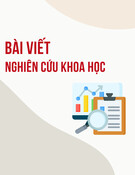

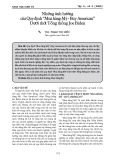
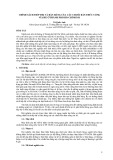
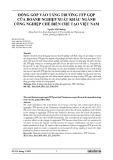
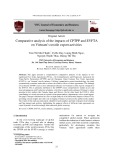
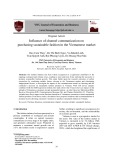













![Bài giảng Kinh tế vĩ mô: Tổng cung – tổng cầu của nền kinh tế và các chính sách kinh tế vĩ mô [chi tiết]](https://cdn.tailieu.vn/images/document/thumbnail/2025/20250903/oursky04/135x160/32461768808266.jpg)

![Bài tập Kinh tế học đại cương [kèm lời giải/ đáp án/ chi tiết]](https://cdn.tailieu.vn/images/document/thumbnail/2025/20250115/sanhobien01/135x160/59331768473355.jpg)

